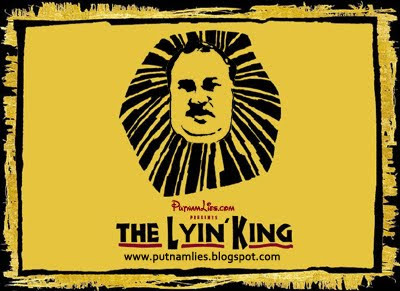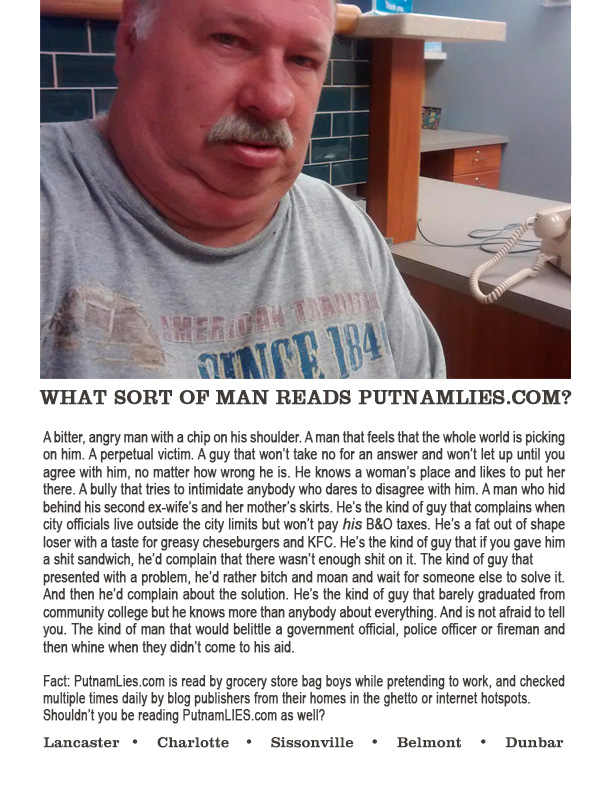
Way back in 2007 just after Hallburn was arrested for harassing the construction foreman at the Walmart construction site, Hallburn and his second ex-wife filed suit against the City of Hurricane, Ben Newhouse, Cleveland Construction, Kanawha Stone and everyone else whose name they could spell. As part of this case both Hallburn and his wife were deposed a year later in 2008.
In February of 2010 Hallburn called the Putnam County Clerk's office at least 10 times DEMANDING to know the names of everybody who checked out the case file. Know what's awesome? They only write down the names of people they take money from so they had only Halburn, his lawyer and the other side's lawyers on the list. Then he tells the clerk that he DEMANDS they seal his mental evaluation and the clerk says, "Um, Mark, only a judge can seal the records." Then he DEMANDS the clerk call Judge Chafin and get him a hearing IMMEDIATELY and the clerk says "Um, buddy ... the case is closed. Anybody off the street can come in and look at whatever they want."
Which is exactly what PutnamLIES.com did.
In May 2009 when Halburn started harassing Girl of Words on her blog, he said, "Here’s a challenge: While you’re pulling court documents and statements that you FEEL are damning to me, why don’t you post the ENTIRE deposition?"
"I am inviting you to publish ALL of the deposition records. EVERY SINGLE WORD, not just “Cherry Pick” the questions and answers that you want to print, those that APPARENTLY are damning to me. We will see whether or not you take the high road or continue with the low road"
We'll take that challenge now, jizz bag.
That's what we're going to do.
We choose the high road.
We have been sitting on this for some time and with Halburn's recent divorce woes, we thought now was a good time to bring it out.
We are going to publish one portion of this deposition each week until it is completed. The first part is mostly legal mumbo jumbo, but stick with us, it gets MUCH better.
We will add our comments in red throughout as salient points arise.
If you have comments, please leave them.
IN THE CIRCUIT COURT OF PUTNAM COUNTY, WEST VIRGINIA
DH and
MARK HALBURN, Plaintiffs,
v.
CITY OF HURRICANE, WEST VIRGINIA,
a municipal corporation, BEN NEWHOUSE,
individually and in his capacity as City Manager
for the City of Hurricane, CLEVELAND
CONSTRUCTION, INC. dba Cleveland
Construction, Inc. Of Nevada, and KANAWHA
STONE COMPANY, INC.,
Defendants.
Civil Action No. 07-C-298
DEFENDANT, KANAWHA STONE COMPANY, INC.'S,
MOTION FOR PARTIAL SUMMARY JUDGMENT
NOW COMES the Defendant, Kanawha Stone Company, Inc. ("Kanawha Stone"), by counsel, Patrick T. White and Huddleston Bolen LLP, and moves this Court to grant it partial summary judgment against the Plaintiffs pursuant to Rule 56 of the West Virginia Rules of Civil Procedure. Because the record evidence clearly indicates that the Plaintiffs' property value has increased, there is no genuine issue of material fact concerning their claim for diminution of property value. Consequently, this Court should grant Kanawha Stone summary judgment on the Plaintiffs' loss of property value claim. Furthermore, because discovery concerning the Plaintiffs' nuisance claims is ongoing, Kanawha Stone reserves its right to file a Motion for Summary Judgment on the same at the completion of said discovery.
Facts
The Plaintiffs initiated the above-styled civil action against Kanawha Stone asserting aprivate nuisance claim. The Plaintiffs claim that they were exposed to excessive light, smoke, dust, and noise from the construction of a Wal-Mart in Putnam County. They allege that they suffered annoyance, inconvenience, mental anguish, diminution of their capacity to enjoy their real estate, and diminution of the value of their real estate.
Although the Plaintiffs claim that the Defendant's activities devalued their real estate, the record evidence in this case indicates exactly the opposite. Mark Halburn testified at his deposition that the value of the subject property has actually increased. See deposition of Mark Halburn at 118, a copy of which is attached hereto as Exhibit A.
Discovery on the reasonableness of Kanawha Stone's activities is ongoing, as is discovery concerning the Plaintiffs' allegations of annoyance, inconvenience, mental anguish, and diminution of their capacity to enjoy their real estate. By Agreed Order, both Plaintiffs will undergo an independent psychological examination on September 11, 2008.
Law and Argument
Rule 56(c) of the West Virginia Rules of Civil Procedures provides, in pertinent part, as follows:
The judgment sought shall be rendered forthwith if the pleadings,
depositions, answers to interrogatories, and admissions on file,
together with the affidavits, if any, show that there is no genuine
issue as to any material fact and that the moving party is entitled to judgment as a matter of law.
W. Va. R. Civ. P. 56(c). In interpreting Rule 56, the Supreme Court of Appeals of West Virginia has held that "summary judgment is proper only if, in the context of the motion and any opposition to it, no genuine issue of material fact exists and the movant demonstrates entitlement to judgment as a matter of law." Syl. Pt. 2, Gentry v. Mangum, 466 S.E.2d 171 (W. Va. 1995).
Furthermore, the Court has explained that "a party who moves for summary judgment has the burden of showing that there is no genuine issue of fact and any doubt as to the existence of such issue is resolved against the movant for such judgment." Syl. Pt. 6, Aetna Cas. & Surety Co. v. Federal Ins. Co. of New York, 133 S.E.2d 770 (W. Va. 1963). Nevertheless, "the party opposing summary judgment must satisfy the burden of proof by offering more than a mere 'scintilla of evidence,' and must produce evidence sufficient for a reasonable jury to find in a nonmoving party's favor. " Painter v. Peavy, 451 S.E.2d 755,758-59 (W. Va. 1994).
A. The Plaintiffs' alleged nuisance injuries are not permanent in nature, but rather temporary, and accordingly, they may not recover damages for diminution in the value of their real estate as a matter of law.
The Plaintiffs are unable to recover diminution in property value, as a matter of law, because their alleged nuisance is temporary in nature, as opposed to permanent. When a nuisance is temporary in nature, a plaintiff may only recover for the cost of repairing his property, expenses directly related to the injury, and loss of use or rent. West v. National Mines Corp, 336 S.E.2d 190, 196 (W. Va. 1985). Additionally, a property owner may recover annoyance and inconvenience caused by the temporary nuisance. Id. However, where a nuisance is temporary, the plaintiff may not recover for loss of diminution in property value and "evidence of the difference between the market value of the property immediately before and immediately after it was injured is inadmissible." Ortesta v. Romano Bros., 73 S.E.2d 622, 631
(W. Va. 1952).
The Plaintiffs' assert a temporary nuisance claim because the nuisance they allege has ceased. In State ex rel. Smith v. Kermit Lumber & Pressure Treating Co., in an attempt to determine the proper statute of limitation period, the Supreme Court of Appeals of West Virginia discussed the differences between a temporary and permanent nuisance claim. 488 S.E.2d 901 (W. Va. 1997). The court observed:
It is said that a nuisance is temporary or continuing where it is remediable, removable, or abatable, or if abatement is reasonably and practicably possible, or, according to some cases, where it is abatable at a reasonable cost, or by the expenditure of labor or money, by the defendant, or by legal process at the instance of the injured party, against the will of the person creating it. On the other hand, a nuisance is permanent if abatement is impracticable or impossible. Injuries to land are incapable of repair and thus permanent in nature when things attached to the land, such as timber, trees, soil, and buildings, are removed or destroyed.
Kermit Lumber, 488 S.E.2d at 924 n.26. Elsewhere in the same decision, the Court noted that the distinction between a temporary and permanent nuisance depends on "whether the nuisance may be discontinued or abated." Id. at 924 (quoting Arcade Water District v. United States, 940 F.2d 1265 (9th Cir. 1991).). Accordingly, whether a nuisance can be terminated is determinative of whether it is permanent or temporary in nature.
The Plaintiffs have asserted that Kanawha Stone's activities concerning the construction of the Putnam County Wal-Mart were a nuisance. Specifically, the Plaintiffs alleged that the Kanawha Stone's activities caused excessive noise, smoke, dust, and light. See Complaint. Because Kanawha Stone's activities on the project are complete, it is no longer working in the area and it is no longer doing or causing any of the activities the Plaintiffs claim were a nuisance. Accordingly, the Plaintiffs' alleged nuisance was temporary because not only was it "remediable, removable, or abatable," but it has actually ceased. Thus, the Plaintiffs have asserted a temporary nuisance claim, which precludes them from recovering damages for diminution in their property. Consequently, this Court should grant Kanawha Stone summary judgment.
B. All evidence indicates that the Plaintiffs' property increased in value, which precludes any recovery for diminution in the value of their real estate.
The Plaintiffs cannot recover for diminution of property value because their property has actually increased in value. Ms. Halburn and her mother purchased the subject property in 1992 for $40,000. See Deposition of DH at 31, a copy of which is attached hereto as Exhibit B. Pursuant to several refinancings and presumably corresponding appraisals, the Plaintiffs currently have a mortgage on the property for $115,000. Id. at 32. They have also received a purchase offer for $160,000, they did not accept. Id. at 46. Additional evidence concerning the increase in their property value comes from local realtor, David Bledsoe. See Depo. of M. Halburn at 107; Plaintiffs' discovery answers, the relevant portion of which is attached hereto as Exhibit C). He told the Plaintiffs that their house is worth several hundred thousand dollars more as commercial property. Mr. Halburn testified:
Q: What do you think the value of the house is?
* * *
A: We have been told that it's worth anywhere between, you know, 300 and 400,000 as commercial property; however, we've never had an actual offer for commercial property.
Q: And who, who's told you this?
A: Mike Hall, Dave Bledsoe.
See Depo. of M. Halburn at 118.
Clearly, the Plaintiffs' property value has increased over time, and it increased dramatically after the Wal-Mart was built. The Plaintiffs have no evidence that their property decreased in value. They have received offers on their property for far more than they paid for it and for more than they owe on it. Further, Plaintiffs admit that the property is worth between $300,000 and $400,000 as commercial property. They have produced absolutely no evidence indicating that their property value has decreased. Therefore, because the evidence indicates that the Plaintiffs' property value has increased and they have failed to produce evidence otherwise, this Court should grant Kanawha Stone summary judgment on the Plaintiffs' diminution in property value claim.
C. Kanawha Stone reserves the right to file a Motion for Summary Judgment on the Plaintiffs' nuisance claims because discovery on these claims is ongoing.
A private nuisance cause of action is judged by the reasonable man standard. See Carter v. Monsanto Co., 575 S.E.2d, 342 (W. Va. 2002). While Kanawha Stone believes that the existing evidence in this case - such as the Plaintiffs blog, news reports of the Plaintiff Mark Halburn's arrests, and the Plaintiffs' depositions - sufficiently indicates that the Halburns are not reasonable people and that their complaints cannot be taken as those made by reasonable people, the independent psychological examination the Plaintiffs will undergo in September should conclusively prove their unreasonableness.
After the independent psychological examination results are received, this Defendant reserves the right to supplement its Motion for Summary Judgment in regard to the Plaintiffs' nuisance claims and the alleged damages arising therefrom.
COMING UP NEXT: Part 1 of Mark Hallburn's deposition - The Bullshit Begins





HAHAHHAAHAHAHAHAHAHA! More Pulitzer-like journalism. Gratz!
ReplyDeleteMore BS from Bsllburn. Mike IS the Lyin King!
ReplyDeleteIs that all you've got, Marky?
ReplyDeleteIt's spelled BALLBURN.
I guess those pudgy fingers are getting the best of you, aren't they crisco?
Try not to drool too much on your keyboard.
How is printing a Motion to Dismiss BS? how is that lying?
We haven't even gotten to YOUR words yet. Are you saying you lied under oath?
I am looking forward to the next chapter.
ReplyDeleteThis looks like it is going to be good. I also enjoyed the, (kind of) hidden "Easter EGG."
ReplyDeleteMore BS from Ballburn??? I don't see how PUBLIC RECORDS coming straight from the courts is BS... I think Hallburn is just squirming because all his LIES are being revealed!!!
ReplyDelete